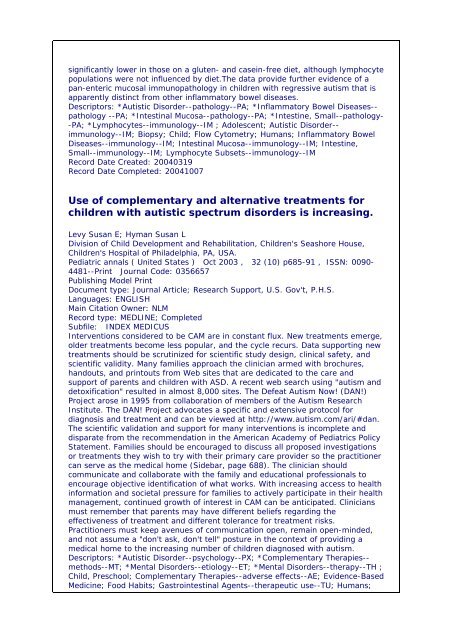Change Of Diet For children With Autism Suffering - Nutrition and ...
Change Of Diet For children With Autism Suffering - Nutrition and ...
Change Of Diet For children With Autism Suffering - Nutrition and ...
Create successful ePaper yourself
Turn your PDF publications into a flip-book with our unique Google optimized e-Paper software.
significantly lower in those on a gluten- <strong>and</strong> casein-free diet, although lymphocyte<br />
populations were not influenced by diet.The data provide further evidence of a<br />
pan-enteric mucosal immunopathology in <strong>children</strong> with regressive autism that is<br />
apparently distinct from other inflammatory bowel diseases.<br />
Descriptors: *Autistic Disorder--pathology--PA; *Inflammatory Bowel Diseases-pathology<br />
--PA; *Intestinal Mucosa--pathology--PA; *Intestine, Small--pathology-<br />
-PA; *Lymphocytes--immunology--IM ; Adolescent; Autistic Disorder-immunology--IM;<br />
Biopsy; Child; Flow Cytometry; Humans; Inflammatory Bowel<br />
Diseases--immunology--IM; Intestinal Mucosa--immunology--IM; Intestine,<br />
Small--immunology--IM; Lymphocyte Subsets--immunology--IM<br />
Record Date Created: 20040319<br />
Record Date Completed: 20041007<br />
Use of complementary <strong>and</strong> alternative treatments for<br />
<strong>children</strong> with autistic spectrum disorders is increasing.<br />
Levy Susan E; Hyman Susan L<br />
Division of Child Development <strong>and</strong> Rehabilitation, Children's Seashore House,<br />
Children's Hospital of Philadelphia, PA, USA.<br />
Pediatric annals ( United States ) Oct 2003 , 32 (10) p685-91 , ISSN: 0090-<br />
4481--Print Journal Code: 0356657<br />
Publishing Model Print<br />
Document type: Journal Article; Research Support, U.S. Gov't, P.H.S.<br />
Languages: ENGLISH<br />
Main Citation Owner: NLM<br />
Record type: MEDLINE; Completed<br />
Subfile: INDEX MEDICUS<br />
Interventions considered to be CAM are in constant flux. New treatments emerge,<br />
older treatments become less popular, <strong>and</strong> the cycle recurs. Data supporting new<br />
treatments should be scrutinized for scientific study design, clinical safety, <strong>and</strong><br />
scientific validity. Many families approach the clinician armed with brochures,<br />
h<strong>and</strong>outs, <strong>and</strong> printouts from Web sites that are dedicated to the care <strong>and</strong><br />
support of parents <strong>and</strong> <strong>children</strong> with ASD. A recent web search using "autism <strong>and</strong><br />
detoxification" resulted in almost 8,000 sites. The Defeat <strong>Autism</strong> Now! (DAN!)<br />
Project arose in 1995 from collaboration of members of the <strong>Autism</strong> Research<br />
Institute. The DAN! Project advocates a specific <strong>and</strong> extensive protocol for<br />
diagnosis <strong>and</strong> treatment <strong>and</strong> can be viewed at http://www.autism.com/ari/#dan.<br />
The scientific validation <strong>and</strong> support for many interventions is incomplete <strong>and</strong><br />
disparate from the recommendation in the American Academy of Pediatrics Policy<br />
Statement. Families should be encouraged to discuss all proposed investigations<br />
or treatments they wish to try with their primary care provider so the practitioner<br />
can serve as the medical home (Sidebar, page 688). The clinician should<br />
communicate <strong>and</strong> collaborate with the family <strong>and</strong> educational professionals to<br />
encourage objective identification of what works. <strong>With</strong> increasing access to health<br />
information <strong>and</strong> societal pressure for families to actively participate in their health<br />
management, continued growth of interest in CAM can be anticipated. Clinicians<br />
must remember that parents may have different beliefs regarding the<br />
effectiveness of treatment <strong>and</strong> different tolerance for treatment risks.<br />
Practitioners must keep avenues of communication open, remain open-minded,<br />
<strong>and</strong> not assume a "don't ask, don't tell" posture in the context of providing a<br />
medical home to the increasing number of <strong>children</strong> diagnosed with autism.<br />
Descriptors: *Autistic Disorder--psychology--PX; *Complementary Therapies-methods--MT;<br />
*Mental Disorders--etiology--ET; *Mental Disorders--therapy--TH ;<br />
Child, Preschool; Complementary Therapies--adverse effects--AE; Evidence-Based<br />
Medicine; Food Habits; Gastrointestinal Agents--therapeutic use--TU; Humans;


